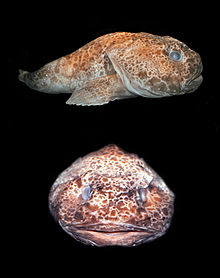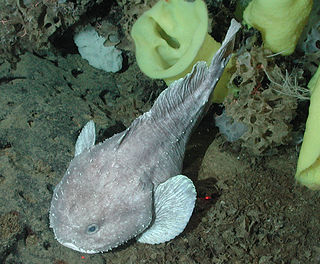
The fish family Psychrolutidae contains over 35 recognized species in 8 genera. This family consists of bottom-dwelling marine sculpins shaped like tadpoles, with large heads and bodies that taper back into small, flat tails. The skin is loosely attached and movable, and the layer underneath it is gelatinous. The eyes are placed high on the head, focused forward closer to the tip of the snout. Members of the family generally have large, leaf-like pectoral fins and lack scales, although some species are covered with soft spines. This is important to the species as the depths in which they live are highly pressurized and they are ambush/opportunistic/foraging predators that do not expend energy unless they are forced to.

Antipodocottus is a genus of marine ray-finned fishes belonging to the family Cottidae, the typical sculpins. These fishes are found in the western Pacific Ocean. This is the only genus of Cottids represented in the Southern Hemisphere, although their classification in the Cottidae is not universally accepted.

The dark toadfish is a species of marine ray-finned fish belonging to the family Psychrolutidae, the fatheads and toadfishes. This fish is found on the continental shelf around New Zealand.
The frilled toadfish is a fathead sculpin of the family Psychrolutidae, found on the continental shelf around Australia's Macquarie Island.

Psychrolutes is a genus of marine ray-finned fishes belonging to the family Psychrolutidae, the fatheads and toadfishes. Though found predominantly in the deep sea, a handful of species are present in the intertidal regions of the North Pacific rim. In June 2003, During the NORFANZ Expedition north-west of New Zealand, scientists trawled a specimen of P. microporos at a depth between 1,013 metres (3,323 ft) and 1,340 metres (4,400 ft) on the Norfolk Ridge.

Bero elegans is a species of marine ray-finned fish belonging to the family Cottidae, the typical sculpins. This species is found in the northwestern Pacific Ocean. This species grows to a length of 20 centimetres (7.9 in) TL. It is the only known member of the genus Bero.
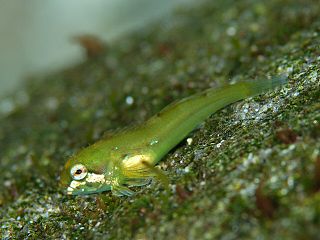
Ocynectes is a genus of marine ray-finned fishes belonging to the family Cottidae, the typical sculpins. This species is found in tidepools in the northwestern Pacific Ocean.
Vellitor is a genus of marine ray-finned fishes belonging to the family Cottidae, the typical sculpins. These fishes are found in seawedd beds in the northwestern Pacific Ocean.

Ambophthalmos is a genus of marine ray-finned fish belonging to the family Psychrolutidae. These fishes are found in the southwestern Pacific Ocean.

Cottunculus is a genus of marine ray-finned fish belonging to the family Psychrolutidae. These fishes are found in the Atlantic, Pacific and Arctic oceans.
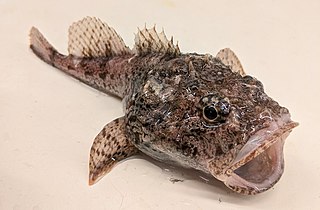
The spinyhead sculpin is a species of marine ray-finned fish belonging to the family Psychrolutidae, the fatheads. This species is found in the northern Pacific Ocean. This species is the only species in the monospecific genus Dasycottus.
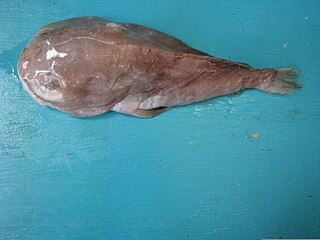
Ebinania is a genus of marine ray-finned fishes belonging to the family Psychrolutidae, the fatheads. These fishes are found in the Southern, Indian, Pacific and Atlantic Oceans.
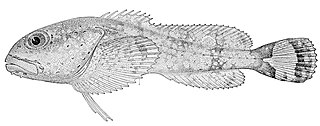
Eurymen is a small genus of marine ray-finned fishes belonging to the family Psychrolutidae, the fatheads. These fishes are found in the northern Pacific Ocean.

Malacocottus is a genus of fatheads native to the northern Pacific Ocean. Malacocottus are typically occupied in the benthic zone near the bottom of the northern Pacific Ocean.
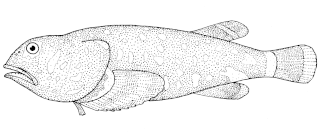
Neophrynichthys is a small genus of marine ray-finned fishes belonging to the family Psychrolutidae, the fatheads. These fishes are found in the southwestern Pacific Ocean waters around New Zealand.

Cottunculus microps, the polar sculpin, is a species of fathead sculpin, a deepwater fish found in the North Atlantic and Arctic Oceans. It was first described in 1875 by the Norwegian zoologist Robert Collett, curator of the Natural History Museum at the University of Oslo.
Ambophthalmos eurystigmatephoros is a species of marine ray-finned fish belonging to the family Psychrolutidae. This species is found in the southwestern Pacific Ocean off Campbell Island, New Zealand at depths of 230 to 282 m. Its body is tadpole-shaped, and they are between 23 and 26 centimeters long.
Cottunculus sadko is a species of marine ray-finned fish belonging to the family Psychrolutidae, the fatheads. This species is found from Greenland to the Norwegian and Kara Seas in the northeast Atlantic Ocean. However, some authorities regard this taxon as a synonym of the Polar sculpin.

The tadpole sculpin is a species of marine ray-finned fish belonging to the family Psychrolutidae, the fatheads and toadfishes. This species is found in the North Pacific Ocean from the Sea of Okhotsk and the Sea of Japan north to the Bering Sea and east and south to the southern Puget Sound in Washington. It is found at depths between 0 and 1,100 m, mainly on soft bottoms although it has been reported from rocky substrates, and may be found along the shore. This species reaches a maximum published total length of 9 cm (3.5 in).

The soft sculpin is a species of marine ray-finned fish belonging to the family Psychrolutidae, the fatheads and toadfishes. This species is found in the North Pacific Ocean from the Bering Sea to the southern Puget Sound in Washington. It is found at depths between 0 and 225 m, mainly in rocky substrates and among sponges, it has also been reported from soft substrates. This species reaches a maximum published total length of 8.3 cm (3.3 in).
